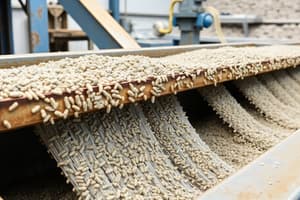Podcast
Questions and Answers
What process leads to the formation of sedimentary rocks?
What process leads to the formation of sedimentary rocks?
- Compaction of mineral and organic particles (correct)
- Cooling and crystallization of magma
- Rising of magma due to tectonic forces
- Transformation of existing rocks due to temperature
Which of the following best describes the origin of metamorphic rocks?
Which of the following best describes the origin of metamorphic rocks?
- They are created from volcanic activity.
- They transform due to high pressure and temperature. (correct)
- They form from the cooling of magma.
- They arise from the accumulation of sediments.
Which type of rock is formed through the crystallization of magma?
Which type of rock is formed through the crystallization of magma?
- Igneous rock (correct)
- Mineral rock
- Sedimentary rock
- Metamorphic rock
What is the primary use of bauxite?
What is the primary use of bauxite?
How do ores contribute to economic development?
How do ores contribute to economic development?
Which separation technique is used to extract sugar from a sugar solution?
Which separation technique is used to extract sugar from a sugar solution?
What does the Law of Superposition state about rock layers?
What does the Law of Superposition state about rock layers?
Which process involves using heat to separate a solvent from a solution?
Which process involves using heat to separate a solvent from a solution?
What is the primary cause for the formation of igneous rocks?
What is the primary cause for the formation of igneous rocks?
Which method would be used to separate material based on magnetic properties?
Which method would be used to separate material based on magnetic properties?
How are fossils primarily formed?
How are fossils primarily formed?
Which type of rock is characterized by being formed through pressure and heat?
Which type of rock is characterized by being formed through pressure and heat?
Which technique uses electrical energy to separate elements from their compounds?
Which technique uses electrical energy to separate elements from their compounds?
Flashcards are hidden until you start studying
Study Notes
Mineral Separation Techniques
- Filtration separates solids from liquids by passing the mixture through a filter. This process removes impurities like sand from water during treatment.
- Evaporation removes a solvent from a solution by heating it until the solvent turns into vapor. This is how salt is extracted from seawater.
- Crystallization involves creating solid crystals from a solution. Sugar can be crystallized by allowing a sugar solution to cool and evaporate.
- Distillation separates liquids by heating them to create vapor and then cooling the vapor back into liquid. Water can be purified by distilling it to remove impurities.
- Magnetism uses magnetic properties to separate magnetic materials from non-magnetic ones. This technique can be used to separate iron filings from sand.
- Chemical Reproduction involves creating new substances through chemical reactions to separate components. Metals can be extracted from ores through chemical processes.
- Electrolysis uses electrical energy to drive a chemical reaction, often separating elements from their compounds. Electrolysis can separate water into hydrogen and oxygen gases.
Fossil Formation and the Law of Superposition
- Fossils form when organisms are buried quickly after death, often in sedimentary rock. Minerals seep into the remains over time, replacing organic material and creating a fossil.
- The Law of Superposition states that in undisturbed layers of rock, the oldest layers are at the bottom and the younger layers are at the top. This helps geologists determine the relative ages of fossils found in different rock layers.
Rocks and Minerals
- Rocks are composed of different minerals. Each type of rock (igneous, sedimentary, and metamorphic) has a unique combination of minerals that contribute to its formation and properties.
Formation of Rocks and Minerals
- The formation of rocks and minerals is influenced by geological forces and energy.
- Igneous rocks form when molten rock (magma or lava) cools and solidifies. The Earth's heat causes magma to rise, and as it cools, it crystallizes into minerals.
- Sedimentary rocks form from the accumulation and compaction of mineral and organic particles. Wind, water, and ice transport these materials, which settle in layers. Over time, pressure compacts these layers into solid rock.
- Metamorphic rocks form from pre-existing rocks that undergo transformation due to high pressure and temperature, often deep within the Earth. Tectonic forces can cause these changes, resulting in new mineral structures.
Valuable Resources from Rocks and Minerals
- Rocks and minerals provide valuable resources.
- Ores are rocks that contain sufficient minerals with economically valuable elements, such as metals.
- Iron ore is crucial for steel production.
- Bauxite is the primary source of aluminum.
- Copper ores are used for electrical wiring and plumbing.
- Extraction and processing of these ores contribute significantly to various industries, making them valuable resources for economic development.
Studying That Suits You
Use AI to generate personalized quizzes and flashcards to suit your learning preferences.




